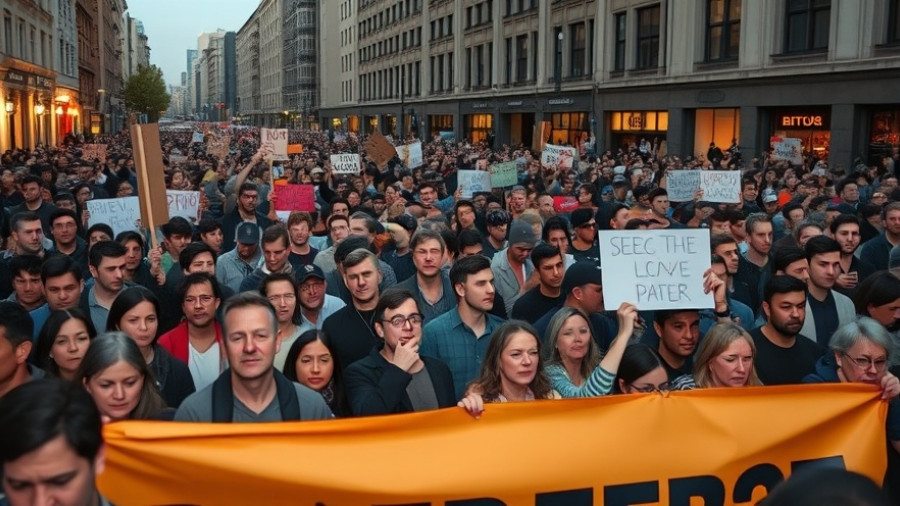
Understanding the Catalyst Behind the Gen Z 212 Movement
Recent protests in Morocco, led predominantly by the youth, have sparked discussions about rising living costs and perceived authoritarian governance. Young Moroccans, identifying as the Gen Z 212 movement, took to the streets to demand reforms in education and healthcare, flagging a concern that resonates deeply within the nation’s socio-political fabric. The protests highlight a generational divide: younger individuals are increasingly willing to challenge a longstanding system that they feel does not adequately serve their needs.
In 'Morocco: more than 1,500 prosecutions after Gen Z protests', the discussion dives into the implications of rising youth activism in Morocco, exploring key insights that sparked deeper analysis on our end.
The Heavy Hand of Prosecution and Its Implications
The swift legal repercussions following these protests cannot be overlooked. Reports indicate that over 1,500 individuals face prosecution, with approximately 1,000 currently detained. This aggressive response from authorities raises questions about the rule of law in Morocco and the extent to which the government will go to suppress dissent. Accusations against protesters include violent clashes with security forces and organizing unauthorized assemblies, reflecting a broader trend of escalating tensions between civilian activists and governmental power structures.
Social Reforms: A Response or Just a Tactic?
In response to the backlash, Morocco’s King announced initiatives aimed at accelerating social reforms, particularly for the sectors of healthcare and education. However, skepticism abounds—are these reforms genuine attempts at addressing systemic issues, or mere placations aimed at quelling unrest? The government has promised improvements in the 2026 budget, yet for many young activists, promises may ring hollow without transparent accountability and actionable results.
Future Predictions: Will This Movement Lead to Sustained Change?
As observed historically in numerous global protests, the question looms large: will the Gen Z 212 movement lead to meaningful reform in Morocco, or will it dwindle in the face of government resistance? A critical analysis reveals a pattern where initial protests lead to dialogue, followed by systemic inertia. The likelihood of sustainable change hinges on the continued engagement of young voters and civil society organizations that hold leaders accountable beyond the immediate reforms promised.
Counterarguments: Dissecting Government Perspectives
It is beneficial to consider the viewpoints of Moroccan authorities regarding these protests. Government officials often argue that stringent measures are necessary to maintain public order and safety. They view dissension through the lens of national stability, showcasing a belief in the necessity of a strong hand in governance. However, such a stance raises significant moral and ethical questions about the limits to which a government may go to suppress voice and free expression.
Connecting the Dots: Regional Implications and Global Awareness
African politics are intertwined, with movements in one nation often inspiring others across the continent. Morocco’s unrest can be seen as part of a larger narrative of youth activism sweeping Africa, particularly amidst rising socioeconomic challenges. Blockages in basic services and governance often lead to frustration among the youth population, fostering a fertile ground for uprisings. Awareness of these issues can galvanize support systems and inspire solidarity movements regionally.
Engaging Professionals: A Call for Civic Responsibility
Professionals in various sectors, from education to politics, need to take notice of the rising engagement among youth in governance and activism. This moment calls for collaborative efforts to empower young voices and create platforms for dialogue. Organizations can facilitate educational workshops and forums that enhance understanding of civil rights and responsibilities, promoting active participation in political discourse.
As we reflect on the events discussed, it is crucial for professionals and concerned citizens alike to stay informed and engaged with the unfolding narrative in Morocco and across Africa. There lies an opportunity for meaningful dialogue and reform, but it requires participation from all segments of society.
 Add Row
Add Row  Add
Add 




Write A Comment